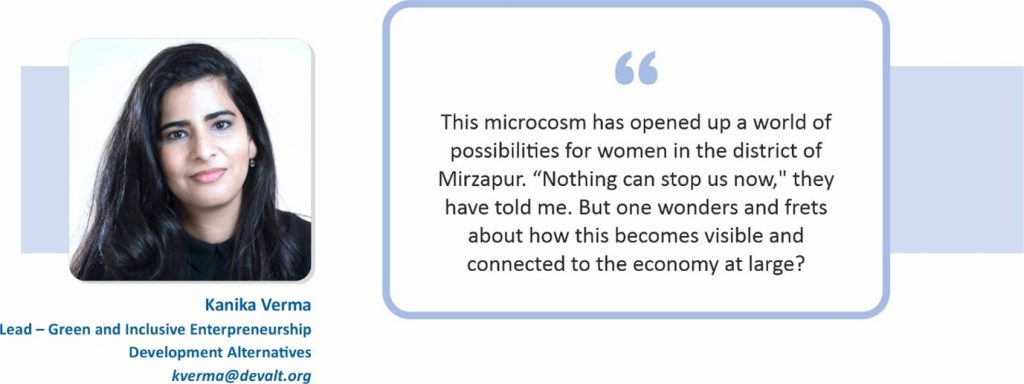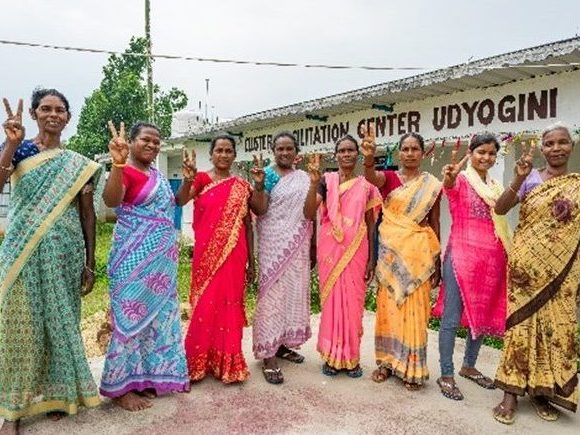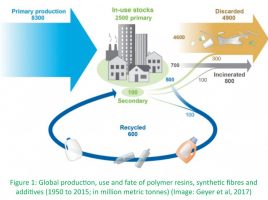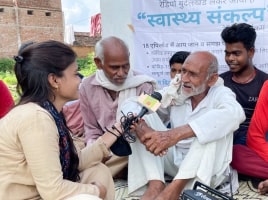Its time for India to embrace its legacy of social economy – the UN resolution can help

In Uttar Pradesh, India, there is a growing micro-system of women-led “safe e-mobility network” driven by 60 battery-powered e-rickshaws that connect women and girls to schools, colleges, and healthcare facilities. It responds to women’s severely constrained mobility and connectivity, which impede the employment or education of women.
This microcosm has opened up a world of possibilities for women in the district of Mirzapur. “Nothing can stop us now,” they have told me. But one wonders and frets about how this becomes visible and connected to the economy at large? Often such solutions are inhibited due to the lack of an enabling architecture for scaling or becoming part of what we would define as the ‘mainstream’ economy.

On 18th April 2023, the United Nations adopted a historic resolution on “Promoting the Social and Solidarity Economy (SSE) for Sustainable Development,” recognising its contribution to the areas of decent work, poverty alleviation, inclusion, social transformation, and promotion of international labour standards and fundamental rights at work and ultimately for achievement and localisation of Sustainable Development Goals (SDGs)[1]. The social economy typically comprises associations, cooperatives, foundations, mutual societies, non-profit organisations, and social enterprises.
The Indian economy, measured in GDP terms, has been growing at an impressive annual rate of 6.5% or more in the last decade, leaving in its wake, however, deepening inequality, lack of social cohesion, and worrying questions about the effects of economic growth on environmental degradation. With its ability to be inclusive, generate livelihood opportunities, and innovate solutions within ecological limits, the social economy opens the door to new institutional and business structures, facilitating the transition to a fairer, more inclusive, and sustainable economy for a country such as India.
Scaling any of these, however, also comes with its set of challenges, where community voices can get lost, limitations in addressing local unemployment, and their restricted impact on the local economy.
India can add another relatively unexplored dimension within the broader discourse on social economy structures. Greater engagement under the social economy frame with the informality within which India’s economy lives and breathes could propel its transition to an inclusive and equitable future. This would mean recognition of the potential of local, everyday entrepreneurs (who remain invisible in the landscape of India’s mainstream economy) in creating social and economic impact that is deep-rooted and sustainable.
 Our country has a great legacy and head start on building institutional structures for equitable economic activity, serving as an instrument for government agencies to tackle issues of poverty through economic and social empowerment. Amul remains a shining example of a large-scale cooperative. The Self-Help Group movement in India is the largest social empowerment initiative globally, with now 92 million women as members. There are also noteworthy examples of social enterprises that create social and environmental impact through innovation in business models and by involving people in their supply chains.
Our country has a great legacy and head start on building institutional structures for equitable economic activity, serving as an instrument for government agencies to tackle issues of poverty through economic and social empowerment. Amul remains a shining example of a large-scale cooperative. The Self-Help Group movement in India is the largest social empowerment initiative globally, with now 92 million women as members. There are also noteworthy examples of social enterprises that create social and environmental impact through innovation in business models and by involving people in their supply chains.
Inclusive entrepreneurship initiatives of Development Alternatives (DA) rely on the use of social innovation tools and methods to create local “entrepreneurship ecosystems” in which a large number of actors work collaboratively to make it easier for people, esp. women, and youth, to set up businesses and run them profitably. Like the ones in Mirzapur – where ordinary people who were excluded from becoming entrepreneurs – becoming successful business persons, creating an average of at least three jobs, and driving the system as powerful change agents within their community and economy.
With this added dimension to the social economy, India can benefit from the UN resolution and its adoption in numerous ways. It can drive policy reforms that acknowledge reality and harness entrepreneurial energies through new ownership modes and shared enabling infrastructure with digital connections to the larger ecosystem.
Moreover, the UN resolution can unlock new market forces with increased public procurement and information availability. It opens the path for innovative mechanisms of socially driven capital, like peer to peer funds or a social stock exchange. Additionally, the resolution facilitates the definition of new impact indicators for measuring well-being.
This dynamic dimension opens up various avenues for the nation to benefit from the social economy structure.
Inclusive Economic Growth: Focus on policy reforms for new forms of ownership and new regulations can create a level playing field and provide avenues for economic participation to marginalized groups in India, such as women, youth, indigenous communities, and persons with disabilities.
Job Creation: New avenues of employment will open in sectors such as microfinance, cooperatives, community-based enterprises, and social enterprises along with grassroot enterprises, contributing to reduced unemployment and improved livelihoods.
Social Cohesion and Empowerment: The Social and Solidarity Economy (SSE) approach will foster social cohesion, community empowerment, and civic engagement in India. It will provide platforms for individuals and communities to actively participate in economic activities, decision-making processes, and shaping their own development. This will lead to increased social capital, trust, and cooperation among diverse groups in society.
Local Knowledge and building an abundance of information: Promoting such enterprises will help tap into India’s rich knowledge systems and local expertise. SSE initiatives can foster innovation at the grassroots level, encouraging the development of sustainable and culturally appropriate solutions to local challenges. This can enhance India’s capacity for social innovation, new market solutions and knowledge sharing.
Future fit transition with technology: Significant opportunity is presented by India’s progressive open digital infrastructure and can enable social economy enterprises to enable the country to be future fit and resilient against future crises related to health among others.
With the social economy as a backbone – ‘causal collisions’ or alternative narratives of the e-mobility network will become the norm in this road less travelled – where progress is based on social value creation, inclusion, and equity, beyond just money. This thought pieces is a shared belief that a new social economy of India, built on principles of social innovation, is not only a befitting parallel to capitalist economics but a much-needed pathway for its bold transformation that will present itself as a true example of a future-fit country and help build a new world order.
[1] United Nations. 2023. Promoting the social and solidarity economy for sustainable development. Details available at https://unsse.org/wp-content/uploads/2023/04/A-77-L60.pdf






Leave a Reply